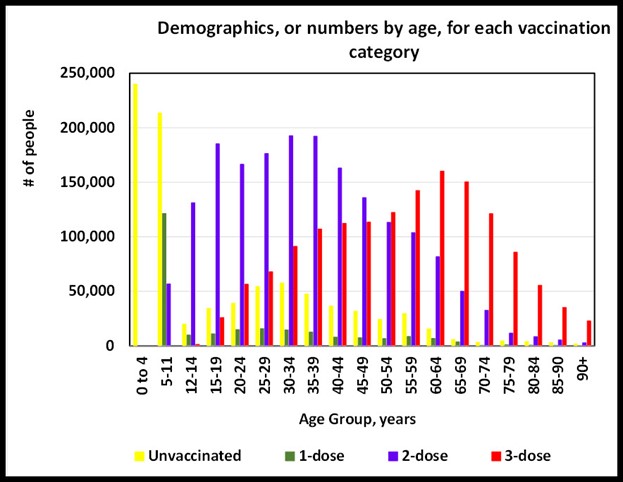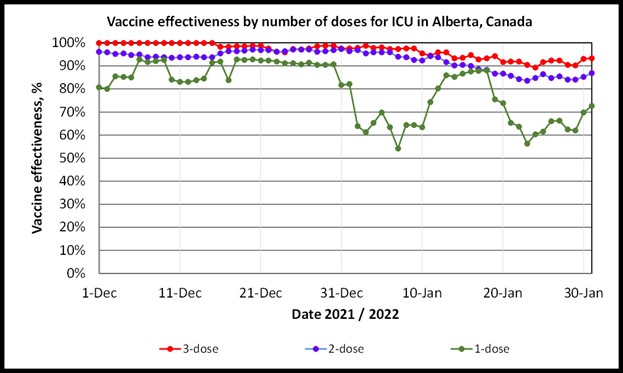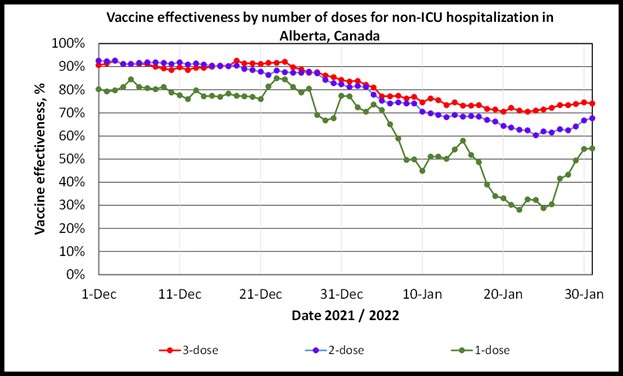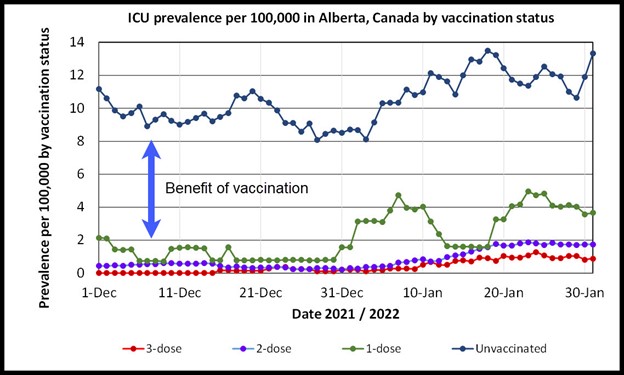In this evaluation of COVID-19 boosters, we take a deeper look into the effectiveness of each dose of mRNA vaccine in December of 2021 and January 2022 in Alberta, Canada. As discussed in this article – Ontario vaccine effectiveness nosedives amid surge in new cases – this time period is during the dominance of the Omicron variant.
We showed in this article The best missed prediction: disease severity 50% lower than we predicted that the Omicron variant appeared to be less severe than the Delta variant, and it was clear that vaccine effectiveness (VE) against catching COVID was effectively zero. With the disease spreading so quickly, governments in Canada, the United States, and elsewhere made booster, or third doses of the Pfizer and Moderna mRNA vaccines more widely available.[1]The CDC reported on Jan. 21, 2022, that the booster shot provides significant relative protection against severe outcomes in the U.S.[2]
In Evaluating the effectiveness of COVID-19 booster shots, we evaluated the effect of the booster against severe outcomes in Alberta, Canada, and showed the following:
- That the 3-dose (booster) scenario provides greater than 90% VE against ICU-level severity when compared to completely unvaccinated persons, but only a moderate positive VE when compared to individuals with 2 doses.
- VE numbers were lower – just over 70% – against non-ICU hospitalization.
- That the demographics of the booster population skew older than the 2-dose population, which affects the overall VE.
This article looks at the VE against ICU severity and non-ICU hospitalization severity for 1-dose, 2-dose, and booster groups. It also takes a step back from VE calculations and examines a simpler measure: prevalence per 100,000 of ICU and non-ICU-hospitalization outcomes. We show that demographic effects are relevant in all of this analysis, and any conclusions drawn from the work must consider the effects of age distribution of the populations being compared.
Decision to exclude children under age 12
Demographics and medically relevant factors are an important element of any evaluation of vaccine effectiveness, with vaccine trials ensuring that vaccinated and unvaccinated groups have characteristics that are as identical as possible.[3]As we mention in Evaluating the effectiveness of COVID-19 booster shots, the populations being compared in a real-world screening method evaluation, should also be as similar as possible, or the results could be invalid. We noted that the booster population skewed more to an older demographic than the 2-dose population. In the bar chart below, we show the demographic data for the key vaccination category populations to be evaluated in this article. They are:
- Unvaccinated
- 1-dose vaccinated group
- 2-dose vaccinated group
- Booster group
In the demographics chart, we see that none of these populations has identical or nearly-identical distributions. The booster group clearly skews older, peaking in the 60-64 age range, the 2-dose population peaks in the 30-39 age range, and the 1-dose group has 50% of its population in the 5-11 age range. The unvaccinated group skews young, with 53% of its individuals being below the age of 12.
These demographic differences introduce the following effects:
- The VE of the booster group will be suppressed relative to all other groups.
- The VE of the 2-dose group will be suppressed relative to the 1-dose group.
We should keep in mind that the younger unvaccinated and 1-dose groups have greater resistance to severe outcomes, as demonstrated in this article, Analysis of the Pfizer COVID vaccine trial for children aged 5 to 11.
These demographic issues are minimized – but not eliminated – by removing children less than 12 years old. Removing children under age 12 can be justified for a severe outcome study by the fact that no children have been admitted to the hospital due to COVID in the last 120 days in Alberta.[4]
Demographic differences between vaccine populations remain. The higher the number of doses, the more the demographic skews from young to old.

Chart outlining demographics for each vaccination type in Alberta Canada as of Jan 31, 2022.[5]The population of the boosters (in red) skew older, while the population of the single dose and unvaccinated groups skew younger. The fact that each dose has materially different demographics creates a challenge in evaluating the effectiveness of the vaccines by dose.
VE estimates for 1 dose, 2 doses, and boosters
We estimate the VE using methods discussed in Evaluating the effectiveness of COVID-19 booster shots. In each case, the vaccine dose group is being compared to the unvaccinated group. The first chart makes this comparison for ICU-level severity in Alberta, Canada, from Dec. 1, 2021, to Jan. 31, 2022.[6]The 1-dose, 2-dose, and 3-dose (booster) VE curves are presented, with the booster showing the highest effectiveness, and the 1-dose being the lowest.

The estimated VE for ICU-level severity in Alberta, Canada, from Dec. 1, 2021, to Jan. 31, 2022.[7]The booster VE is the highest over most days. The 1-dose VE averages the lowest.
The same comparison is made below for non-ICU hospitalization.[8]Each vaccine category tracks similarly to the others. All values are lower than for ICU severity. As with ICU severity, the 3-dose VE is generally the highest, and the 1-dose VE is generally the lowest.

The estimated VE for non-ICU-hospitalization severity in Alberta, Canada, from Dec. 1, 2021 to January 31, 2022.[9]All three VE values have similar trends. The 3-dose VE is generally the highest, and the 1-dose VE is the lowest.
Prevalence per 100,000
The number of people in ICU per 100,000 persons is shown in the chart below.[10]All three vaccination categories have significantly lower prevalence than the unvaccinated group. The booster group enjoys lower prevalence than the 2-dose or 1-dose groups.

The rate per 100,000 for ICU-level severity by vaccination status in Alberta, Canada, from Dec. 1, 2021, to Jan. 31, 2022.[11]Lower numbers indicate lower prevalence. The booster prevalence is lower over most days. The 1-dose VE averages the highest, but on some days is lower than the 2-dose VE. The unvaccinated group has the highest prevalence of all groups.
The prevalence for non-ICU hospitalization per 100,000 persons is shown in the chart below.[12]All three vaccination categories have significantly lower prevalence than the unvaccinated group. The booster group enjoys lower prevalence than the 2-dose or 1-dose groups, and the 2-dose group has a lower prevalence than the 1-dose group.

The rate per 100,000 for non-ICU-hospitalization severity by vaccination status in Alberta, Canada, from Dec. 1, 2021, to Jan. 31, 2022.[13]The 1-dose, 2-dose and 3-dose prevalences are all lower than the unvaccinated group prevalence.
Interpretation
Over half of the unvaccinated individuals in Alberta are under the age of 12, and 50% of those with only 1 dose of the vaccine are in the 5-11 age range. The high numbers of younger persons in these vaccination categories is important in an evaluation of vaccine effectiveness. We therefore excluded children under 12 years old in this analysis. The justification to exclude them included the fact that no child has been admitted to the hospital because of COVID in Alberta recently.
It could be argued that the performance of the booster group may be muted by the older age of its population, but the 3-dose vaccine effectiveness is still generally the highest, and its incidence of ICU severity or non-ICU-hospitalization severity is shown as the most favorable. The 2-dose population rates the second best.
References
[1] Sun, Lena, et al, January 21, 2022, Booster shots in U.S. have strongly protected against severe disease from omicron variant, CDC studies show, Washington Post
[2] CDC, January 21, 2022, Effectiveness of a Third Dose of mRNA Vaccines Against COVID-10-Associated Emergency Department and Urgent Care Encounters and Hospitalizations Among Adults During Periods of Delta and Omicron Variant Predominance—Vision Network, 10 States, August 2021-January 2022, MMWR
[3] Cohen, Adam et al, 2012, An Assessment of the Screening Method to Evaluate Vaccine Effectiveness: The Case of 7-Valent Pneumococcal Conjugate Vaccine in the United States, PLOS ONE
[4] Interactive aggregate data on COVID-19 cases in Alberta, Government of Alberta, February 2, 2022
[5] Interactive aggregate data on COVID-19 cases in Alberta, Government of Alberta, February 2, 2022
[6] Interactive aggregate data on COVID-19 cases in Alberta, Government of Alberta, February 2, 2022
[7] Interactive aggregate data on COVID-19 cases in Alberta, Government of Alberta, February 2, 2022
[8] Interactive aggregate data on COVID-19 cases in Alberta, Government of Alberta, February 2, 2022
[9] Interactive aggregate data on COVID-19 cases in Alberta, Government of Alberta, February 2, 2022
[10] Interactive aggregate data on COVID-19 cases in Alberta, Government of Alberta, February 2, 2022
[11] Interactive aggregate data on COVID-19 cases in Alberta, Government of Alberta, February 2, 2022
[12] Interactive aggregate data on COVID-19 cases in Alberta, Government of Alberta, February 2, 2022
[13] Interactive aggregate data on COVID-19 cases in Alberta, Government of Alberta, February 2, 2022
(Lee Hunt – BIG Media Ltd., 2022)


